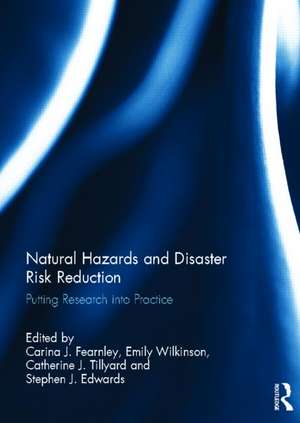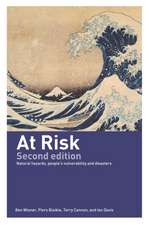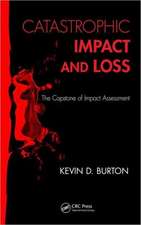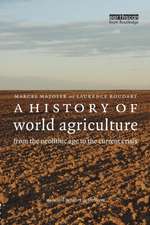Natural Hazards and Disaster Risk Reduction: Putting Research into Practice
Editat de Carina Fearnley, Emily Wilkinson, Catherine J. Tillyard, Stephen J. Edwardsen Limba Engleză Hardback – 19 iul 2013
As with the conference, this book successfully brings together views from humanitarian and development agencies, academia, business, government and funding bodies. It is rare to engage such a wide range of sectors in a discussion relating to the issues of disaster risk reduction from a natural hazards perspective, and the book captures this interaction and the resultant exchange of ideas, thus providing an insight into how stakeholders respectively undertake or engage with natural hazards research. Collectively, the articles highlight the need for greater dialogue, understanding and collaboration between all these sectors if research is to be made relevant and generate significant impact on risk reduction policy and practice. There is an urgent requirement to better understand the respective needs, ways of working, project timescales and funding mechanisms for disaster risk reduction, as well as the challenges posed by institutional and organizational structures and functions. These issues must be overcome to ensure that ultimately, and most significantly, discussions turn into positive practical actions so that research on natural hazards is relevant and applicable. The book represents a step in that journey.
This book was published as a special issue of Environmental Hazards.
| Toate formatele și edițiile | Preț | Express |
|---|---|---|
| Paperback (1) | 255.27 lei 6-8 săpt. | |
| Taylor & Francis – 14 oct 2024 | 255.27 lei 6-8 săpt. | |
| Hardback (1) | 818.52 lei 6-8 săpt. | |
| Taylor & Francis – 19 iul 2013 | 818.52 lei 6-8 săpt. |
Preț: 818.52 lei
Preț vechi: 1139.64 lei
-28% Nou
Puncte Express: 1228
Preț estimativ în valută:
156.62€ • 163.53$ • 129.63£
156.62€ • 163.53$ • 129.63£
Carte tipărită la comandă
Livrare economică 04-18 aprilie
Preluare comenzi: 021 569.72.76
Specificații
ISBN-13: 9780415834605
ISBN-10: 0415834600
Pagini: 120
Ilustrații: 3 halftones and 10 line drawings
Dimensiuni: 174 x 246 x 13 mm
Greutate: 0.38 kg
Ediția:New.
Editura: Taylor & Francis
Colecția Routledge
Locul publicării:Oxford, United Kingdom
ISBN-10: 0415834600
Pagini: 120
Ilustrații: 3 halftones and 10 line drawings
Dimensiuni: 174 x 246 x 13 mm
Greutate: 0.38 kg
Ediția:New.
Editura: Taylor & Francis
Colecția Routledge
Locul publicării:Oxford, United Kingdom
Public țintă
AcademicCuprins
Preface 1. Culture and disaster risk reduction: Lessons and opportunities 2. Disaster-induced migration: Assessing the impact of extreme weather events on livelihoods 3. Building livelihoods to reduce risk among the most marginalized in urban areas: Strategic approaches from Dhaka 4. Evaluating critical links in early warning systems for natural hazards 5. ‘Community’ perceptions of a disaster risk reduction intervention at Santa Ana (Ilamatepec) Volcano, El Salvador 6. Why ‘small is beautiful’ in municipal disaster risk reduction: Evidence from the Yucatán peninsula, Mexico 7. Conference summary on disaster risk reduction for natural hazards: Putting research into practice
Descriere
As one of the first interdisciplinary and multi-perspective investigations, Disaster risk reduction for natural hazards: putting research into practice provides a practical yet intellectually challenging investigation into the emerging field of disaster risk reduction.
This book was published as a special issue of Environmental Hazards.
This book was published as a special issue of Environmental Hazards.
Notă biografică
Carina J. Fearnley is a lecturer in Environmental Hazards at the Institute of Geography and Earth Sciences, Aberystwyth University. She is an interdisciplinary researcher bringing together hazard science, disaster management, and science and technology studies to better understand natural hazard early warning systems, specifically volcano alert level systems. Recently, research interests have broadened to the application and analysis of science and art collaborations for natural hazards, as well as the role of geopolitics in making early warning systems effective.
Emily Wilkinson is a Research Fellow in the Climate Change, Environment and Forests Programme at the Overseas Development Institute. Her research focuses on policy and institutional dimensions of disaster risk management and climate change adaptation. Recently, she has been using a political economy lens to explore the constraints to collective action on risk management and is developing a line of research on the use of risk information in national and local-level policy-making.
Catherine J. Tillyard (nee Lowe) works in Catastrophe Management at the global reinsurance broker, Aon Benfield in London. Having completed a PhD in volcanic vulnerability and risk assessment, her role in the commercial sector centres on catastrophe risk management for the re/insurance industry. A key focus is to bring business and academia together to work on state-of-the-art research that has direct relevance to the re/insurance industry, in addition to investigating how the corporate sector can work more closely with NGOs on common problems around disaster risk reduction.
Stephen J. Edwards is an Earth Scientist at University College London, where he is the Deputy Director of the Aon Benfield UCL Hazard Centre in the Institute for Risk and Disaster Reduction. He specialises in the assessment and management of risk associated with natural hazards and natural resources, particularly volcanism and water. Stephen has over 25 years of research, teaching, training and knowledge exchange experience through his work at universities in the UK, Canada, Hong Kong and Papua New Guinea. He uses this experience to facilitate and sustain partnerships with the business, humanitarian and development sectors in order to assist them understand and reduce potential disaster and resource risk through greater engagement with the natural and environmental sciences.
Emily Wilkinson is a Research Fellow in the Climate Change, Environment and Forests Programme at the Overseas Development Institute. Her research focuses on policy and institutional dimensions of disaster risk management and climate change adaptation. Recently, she has been using a political economy lens to explore the constraints to collective action on risk management and is developing a line of research on the use of risk information in national and local-level policy-making.
Catherine J. Tillyard (nee Lowe) works in Catastrophe Management at the global reinsurance broker, Aon Benfield in London. Having completed a PhD in volcanic vulnerability and risk assessment, her role in the commercial sector centres on catastrophe risk management for the re/insurance industry. A key focus is to bring business and academia together to work on state-of-the-art research that has direct relevance to the re/insurance industry, in addition to investigating how the corporate sector can work more closely with NGOs on common problems around disaster risk reduction.
Stephen J. Edwards is an Earth Scientist at University College London, where he is the Deputy Director of the Aon Benfield UCL Hazard Centre in the Institute for Risk and Disaster Reduction. He specialises in the assessment and management of risk associated with natural hazards and natural resources, particularly volcanism and water. Stephen has over 25 years of research, teaching, training and knowledge exchange experience through his work at universities in the UK, Canada, Hong Kong and Papua New Guinea. He uses this experience to facilitate and sustain partnerships with the business, humanitarian and development sectors in order to assist them understand and reduce potential disaster and resource risk through greater engagement with the natural and environmental sciences.











